27. Bonny Barbara Allan (Child 84)
Of all the ballads in the Child collection this is easily the most widely known and sung, both in the old country and in America. Scarcely a single regional gathering of ballads but has it, and it has been published in unnumbered popular songbooks. See BSM 60-1. Mrs. Eckstorm in a letter written in 1940 informed me that she and Barry had satisfied themselves, before Barry's death, that as sung by Mrs. Knipp to the delight of Samuel Pepys in 1666 it was not a stage song at all but a libel on Barbara Villiers and her relations with Charles II; but so far as I know the details of their argument have never been published. The numerous texts in the North Carolina collection may conveniently be grouped according to the setting in three divisions: (1) those that begin in the first person of Barbara's lover (or at least of the narrator), (2) those that begin with a springtime setting, and (3) those that begin with an autumnal setting. Of course those in group 1 may also have either the springtime or the autumnal setting. The rose-and-brier ending is likely to be attached to any of the texts. The lover's bequests to Barbara, a feature not infrequent in modern British versions but unusual in America, appears once in the North Carolina texts, in F. The first person of the lover commonly is dropped after the opening stanza, but in F it holds through four stanzas. Not all of the texts are given in full.
A. 'Barbara Allen.' Sent April 3, 1913, by Miss Lila Ripley Barnwell of Hendersonville, Henderson county, to the Charlotte Observer, and printed there shortly afterwards. Sung by her great-grandmother. Belongs to the tradition of the English broadsides, Child's B, but is somewhat reduced.
1. In Scarlet Town where I was born
There was a fair maid dwelling
Made every youth cry 'Well-away'
Her name was Barbara Allen.
2 All in the merry month of May
When green buds they were swelling,
Young Jimmy Grove on his death bed lay
For the love of Barbara Allen.
3 He sent his man unto her then,
To the town where she was dwellin';
'You must come to my master dear,' he said,
'If your name is Barbara Allen.'
4 So slowly, slowly she came up
And slowly she came nigh him.
And all she said as there she stood:
'Young man, I think you're dying.'
5 He turned his face unto the wall,
And death was with him dealing.
'Adieu, adieu, my dear friends all,
Adieu to Barbara Allen.'
6 As she was walkin o'er the fields
She spied the corpse a-coming.
'Lay down, lay down the corpse,' she said,
'That I may look upon him.'
7 With scornful eye she looked down,
Her cheeks with laughter swellin'.
And all her friends cried out amain,
'Oh, shameful Barbara Allen!'
8 When he was dead and laid in grave
Her heart was struck with sorrow.
"Oh, mother, mother, make my bed.
For I shall die tomorrow.
9 'Farewell,' she said, 'ye virgins all.
And shun the fault I fell in ;
Henceforth take warning by the fall
Of cruel Barbara Allen.'
B. 'Barbara Allen.' From the John Burch Blaylock Collection. During the years 1927-32 Mr. John Burch Blaylock, of Yanceyville, Caswell county, collected 274 songs from Caswell and adjoining counties. In December 1944 his collection was presented, through the efforts of Dr. W. Amos Abrams, to the North Carolina Folklore Society. From the whole number "about 112" were selected by Professor Hudson and added to the Frank C. Brown Collection. These 112 are referred to here and in later notes as the John Burch Blaylock Collection. — Ed.
1 In Scarlet town, where I was born,
There was a fair maid dwellin'
Made every youth cry 'Well away!'
Her name was Barbara Allen.
All in the merry month of May
When green buds they were swellin',
Sweet William on his deathbed lay
For love of Barbara Allen.
2 And death is printed on his face,
And o'er his heart is stealin';
Then haste away to comfort him,
lovely Barbara Allen.
So slowly, slowly she came up,
And slowly she came nigh him.
And all she said when there she came :
'Young man, I think you're dyin'.'
3 He turned his face unto her straight,
With deadly sorrow sighin':
'O pretty maid, come pity me —
I'm on my deathbed lyin'.'
If on your deathbed you do lie.
What need the tale you're tellin'?
I cannot keep you from your death.
Farewell!' said Barbara Allen.
4 He turned his face unto the wall.
And death was with him dwellin':
'Adieu, adieu, my dear friends all.
Adieu to Barbara Allen.'
As she was walking o'er the field
She heard the bells a-knellin'.
And every stroke did seem to say :
'Unworthy Barbara Allen!'
5 She turned her body round about
And spied the corpse a-comin'.
'Lay down, lay down the corpse,' she said,
'That I may look upon him.'
With scornful eyes she then looked down,
Her cheeks with laughter swellin'.
While all her friends cried out amain :
'Unworthy Barbara Allen!'
6 When he was dead and in his grave
Her heart was struck with sorrow.
'Oh, mother, mother, make my bed.
For I shall die tomorrow.
Hard-hearted creature him to slight
Who loved me all so dearly.
Oh, that I had been kind to him
When he was alive and near me!'
7 She on her deathbed as she lay
Begged to be buried by him,
And sore repented of the day
That she did e'er deny him.
'Farewell,' she said, 'ye virgins all.
And shun the fault I fell in.
Henceforth take warning of the fall
Of cruel Barbara Allen.'
C. 'Barbara Allen.' Printed March 30, 1913, in the Charlotte Observer as sung to the contributor "years ago by Mrs. E. A. Crowell, who was then matron at the Western North Carolina Hospital at Morganton." It belongs to the same tradition as A, but the name of the town and the name of the lover are different and it has the rose-and-brier ending.
Begins:
At Stoney, Stoney, Stoney town there were three fair maids dwelling.
There's one of them I call my own, by the name of Barbara Allen.
Young Jimmy Grose on his death bed lay and sent his servant to her. . . .
When she meets the corpse she weeps, not laughs:
The more she looked, the more she wept, until she burst out a-crying,
and it ends :
Young Jimmie was buried m the church churchyard, and his love by the side of him.
And out of his grave there grew a red rose and out of his love's a brier.
They grew, they grew to the church steeple top and then could grow no higher.
They tied themselves in a true lover's knot, both the red rose and the brier.
D. 'Barbara Allen.' Contributed in 1923 by Miss Flora Marie Meredith of Durham. It is the same version as A but fuller, and is therefore given.
1. In Scarlet Town where I was born
There was a fair maid dwelling,
And every youth cried 'Well aware, [1]
Unworthy Barbara Allen!'
2. In the merry month of May,
When green buds they were swelling,
Young Jimmie Grove on his deathbed was lying
For the love of Barbara Allen.
3 He sent his man into the town,
To the place where she did dwell in,
Saying, 'You must come to my master,
If your name be Barbara Allen.
4 'For death is painted on his face
And o'er his breast be stealing;
I [2] haste away to comfort him,
lovely Barbara Allen!'
5 'If death be painted on his face
What needs the tale he's telling?
Yet little the better shall he be
For bonny Barbara Allen.'
6 So slowly, slowly she came down
And slowly she came nigh him.
And all she said when there she came
Was 'Young man, I think you're dying.*
7 He turned his face unto her straight,
With deadly sorrow saying,
Oh, pretty miss, come pity me,
For I'm on my death bed lying.'
8 'If on your death bed you do be,
What needs the tale you're telling?
I cannot keep you from your death.
Farewell,' says Barbara Allen.
9 As she was walking o'er the field
She heard the church bell knelling,
And every stroke appeared to say
'Unworthy Barbara Allen.'
10 She turned herself around about
And spied the corpse coming.
'Lie down, lie down the corpse,' she cried,
'That I may look upon him.'
11 With scornful eyes she looked down,
Her cheeks with laughter swelling,
And all her friends cried out 'Amen,
Unworthy Barbara Allen.'
12 When he was dead and laid in grave
Her heart was struck with sorrow,
Saying 'Mother, mother, make my bed,
For I shall die tomorrow.
13 'Hard-hearted creature him to slight
Who loved me so dearly.
Oh, had I been more kind to him
When he was alive and near me !
14 'Farewell, farewell, ye virgins all,
And shun the fault I did him ;
Henceforth take warning of the fault
Of cruel Barbara Allen.'
1. This looks like a folk-etymologizing of the archaic "well-a-way."
2. Probably an error, of hearing or writing, for "Oh."
E. 'Barbara Allen.' As sung by Mr. or Mrs. C. K. Tillett, Wanchese, Roanoke Island, December 29, 1922. The text is much like D but it has "Scarborough" instead of "Scarlet" in line 1, inserts stanza 5 of A after stanza 8, and the first half of stanza 7 of B after stanza 12.
F. 'Barbara Allen.' Secured by Julian P. Boyd while principal of schools at Alliance, Pamlico county, from Duval Scott, one of his pupils. Exceptional in that the first person of the lover is maintained through several stanzas and the lover makes a bequest to Barbara.
1 It was one morning in the month of May
When all the flowers were blooming,
I fell in love with a fair young girl;
Her name was Barbara Allen.
2 I courted her six months or more.
Was about to gain her favor;
'Oh wait! oh wait, oh wait!' she said.
'Some young man's gained my favor.'
3 I went right home, was taken sick.
And sent for Barbara Allen.
She came, she came, so slow she came
To see her true love dying.
4 When she came in, she said to me:
'Young man, you are a-dying!'
'One kiss, one kiss from your sweet lips
Would save me, Barbara Allen.'
5 'If I knew one kiss would kill you dead,
I would freely give you a hundred.'
He turned his face to the milk-white walls
And turned his back upon her.
6 'Do you remember the other day
When we were at the tavern?
You treated all those fair young girls
And slighted Barbara Allen.'
7 'When I am dead, look under my head
And you will find two rolls of money.
Go share it with those fair young girls,
And share with Barbara Allen.'
8 It was the next morning, when she woke up.
She heard those death bells ringing;
They rang so loud they seemed to say
'Hard-hearted Barbara Allen.'
9 She looked to the east, she looked to the west;
She saw the cold corpse coming.
'Oh, mother dear, come carry me home.
For now I am dying.
10 'Oh, mother, oh, mother, go make my bed!
Go make it high and narrow!
Today Sweet William died for love.
Tomorrow I'll die for sorrow.'
11 They buried him in one church yard
And Barbara in another.
From his grave there grew a rose,
And from hers there sprang a briar.
12 They grew, they grew to the steeple top
Till they could grow no higher;
They tied themselves in a true love knot,
The wild rose and the briar.
G. 'Barbara Allen.' Secured by Mrs. R. C. Vaught at Oakboro, Stanly county. It is of the same general pattern as A and D, yet has so many differences in detail that it is given in full.
1. In yonder town where I was born
There was a fair maid dwelling
Made every youth to weal or woe;
Her name was Barbara Allen.'
2 One day, one day in the month of May,
When the green leaves were a-sweUing,
Young WiUiam came from a western state
And courted Barbara Allen.
3 It was early in the month of June,
When the flowers [were] a-blooming,
Young William on his death bed lay
For the love of Barbara Allen.
4 He sent his servants through the town
To the place where she was dwelling,
Saying,, 'Love, there's a call for you.
If your name be Barbara Allen.'
5 Oh, slowly, slowly she fixed up,
And slowly she came nigh him.
The only words she said to him:
'Young man, I think you're dying.'
6 'Oh, yes, I'm sick and very, very sick
And on my death bed lying;
But from thee, I'm sure to be,
One kiss from you would cure me.'
7 'You may be sick, and very, very sick.
And on your death bed lying;
But better for me, you'll never be
Though your heart's blood were a-spilling.
8 'For don't you remember the other night
When you were in town a-drinking
You drank a health to the ladies all around
And slighted Barbara Allen?'
9 'Yes, I remember the other night
When I was in town a-drinking.
I drank a health to the ladies all around.
But my love to Barbara Allen.'
10 He reached his hands from the pale bed sheet
A-thinking for to touch her.
But she jumped back, and then she said,
'Young man, I will not have you.'
11 He turned his pale face to the wall.
And death was with him dealing.
'Adieu, adieu, my dear friends all;
Be kind to Barbara Allen.'
12 Then she arose and left the room
Where her true love was dying.
And every tongue did seem to say
'Hard-hearted Barbara Allen.'
13 As she was walking o'er the fields
She heard the death bell ringing.
And every stroke did seem to say
'Oh, woe to Barbara Allen.'
14 As she was walking o'er the field
She heard the birds a-singing.
And every note did seem to say
'Oh, turn back, Barbara Allen.'
15 She'd not gone more than half a mile
She saw the corpse a-coming.
'Lay down, I pray, the corpse of clay
That I may look upon him.'
16 The more she looked the more she grieved
Until she started crying;
And then she kissed those tear-cold cheeks
That she'd refused when dying.
H. 'Barbara Allen.' Written down for W. Amos Abrams in 1939 by Miss Edna Milam of Milam. It is the same version as G; but it has lost stanzas 4 and 10, has an intelligible reading in the third line of stanza 6: "But better for thee I'm sure to be" ; has "dear cold cheeks" instead of "tear-cold cheeks" in stanza 16; and has the normal ending, lacking in G:
15 'Oh, mother, mother, make my bed.
Oh make it soft and narrow;
My true love's died for me today,
I'll die for him tomorrow.
16 'Oh, father, father, dig my grave.
And dig it deep and narrow;
Young William's died for pure, pure love
And 1 shall die for sorrow.'
17 Oh she was buried in the old church yard,
And William was buried by her;
Out of William's grave grew a red, red rose
And out of hers a sweetbrier.
18 They grew and grew to the old church tower,
Till they could not grow any higher;
And then they tied in a true-lovers' knot
And the rose wrapped round the brier.
I. 'Barbara Allen.' Collected by Kendrick Few of Durham in 1940 from Sidney Stovall, Buies Creek, Harnett county. It is almost exactly Child's B version.
J. 'Barbara Allen.' From Miss A. M. Martin, time and place not given. This text begins something like C:
Over, over w^as the town
Where three fair maids were dwelling.
There was but one I called my own
And that was Barbara Allen.
In the death-bed scene it has a stanza corresponding to the tenth stanza of G:
He reached forth his pale white hand,
Aiming for to touch her;
She slipped and danced all over the floor
And says, 'I will not have you.'
It has the rose-and-brier ending.
K. 'Barbara Allen.' Collected by W. Amos Abrams from Mary Bost of Statesville, Iredell county. The opening seems to have crept in from some other song:
J. J. Smith and it is my name.
New Alban is my station.
This is my dwelling here,
Also my respectation.
Honor, Honor was the town
Where there was three fair maids a-dwelling.
There was but one that I called my own
And that was Barbara Allen.
After that it runs pretty regularly, ending with directions for her burial and the rose-and-brier stanzas. Just before the last two stanzas it has the following, found also in version J above and versions T and W below:
Sweet William died on Saturday
And Barbara on Sunday.
The old woman died for the love of both —
She died on Easter Monday.
L. 'Barbra Allen.' From W. C. Neal of Sparta, Alleghany county. Very close to but not quite identical with Child's B.
M. 'Barbary Allen.' Contributed by Charles R. Bagley of Moyock, Currituck county, in 1915. A fairly normal text, though it lacks the charge that he slighted her at the drinking of toasts. When she meets the corpse she is scornful, "her cheeks with laughter swellin' "; remorse comes later. This has not the rose-and-brier ending.
N. 'Barbara Allen.' Collected in 1927 by L. W. Anderson from Alva Wise of Nag's Head, Dare county. Closely similar to L.
All of the texts thus far listed begin in the first person. The remaining texts do not, but open with a statement of the time of year; in O-Y it is springtime, in Z-DD it is autumn. Otherwise the texts run much the same as in the preceding section, with a lesser range of variation.
O. 'Barbara Allen.' Reported by Thomas Smith of Zionville, Watauga county, from the singing of Mrs. Julia Grogan. Text sent to C. A. Smith in 1914 and afterwards to the Brown Collection.
1. Early, early in the spring,
When the flower buds were a-swellin',
Sweet Willie he was taken sick
For the love of Barbara Allen.
2 He sent his servant to the town
Where Barbara was a-dwellin' :
'My master said for you to come
If your name be Barbara Allen.'
3 Slowly, slowly she came up
And slowly she went near him,
And all she said when she got there,
'Young man, I think you are dyin'.'
4 'Oh yes, oh yes, I am very low,
And death is in me dwellin';
No better will I ever be
Till I get Barbara Allen.'
5 'Oh yes, you are very low.
And death is in you dwellin .
No better will you ever be
By getting Barbara Allen.
6 'Don't you remember in yonder town
Where you were all a-drinkin'?
You drank to the health of the ladies round
And you slighted Barbara Allen.'
7 'Oh, yes, I remember in yonder town
Where we were all a-drinkin',
I drank a health to the ladies round
And my love to Barbara Allen.'
8 Slowly, slowly she rose up
And slowly she went from him.
'It's if you die, and die you must,
You'll never get Barbara Allen.'
9 She had not got a mile away
Till she heard the death bells tollin'.
And every stroke they seemed to say
'Hard-hearted Barbara Allen.'
10 She looked to the east, she looked to the west,
And saw the corpse a-comin'.
'Oh, lay him down, oh, lay him down
So I may look upon him!'
11 The more she looked, the more she sighed
Until she burst out cryin'.
And she cried until the day she died
For the love of Willie Harrell.
12 'Oh, mother, make my dying bed,
And make it soft and narrow.
Sweet Willie died for me today,
I will die for him tomorrow.'
13 Sweet Willie was buried in the new churchyard
And Barbara buried beside him.
Out of his grave grew a red rose bush
And out of hers a brier.
14 They grew till they reached the church top,
And there they could grow no higher.
And there they entwined in a true love knot,
The rose bush and the brier.
P. 'Barbara Allen.' From the ballad collection of Miss Isabel Rawn (afterwards Mrs. T. L. Perry), sent to Dr. Brown probably in 1915.
1. One morning, one morning in the month of May,
The flowers they were blooming.
Sweet William on his deathbed lay
For the love of Barb'ra Allen.
2. He sent his servant to the town
Where Barb'ra was a-dwelling:
'My master sent me here for you,
If this be Barb'ra Allen.'
3 Slowly, slowly she rose up
And slowly she went to him.
The very first words that she did say:
'Young man, I think you are dying.'
4 'Oh yes, oh yes, I am very bad off,
But one sweet kiss will save me.
Just one sweet kiss from the rose-red lips
Of my dear Barb'ra Allen.'
5 'Young man, young man, you are very bad off,
And, yes, perhaps you are dying;
But you cannot have the kiss you want.
The one from Barb'ra Allen.'
6 He turned his pale face to the wall
And turned his back upon her.
'Farewell, farewell to this old world.
And adieu to Barb'ra Allen.'
7 Slowly, slowly she rose up
And slowly she went from him.
She had not gone but a very short way
Till she heard the death-bells ringing.
8 She looked to the east and she looked to the west;
She saw his pale corpse coming.
She covered her face with her two white hands
And rushed home to her mother.
9 'Oh, mother, go and fix my bed,
Go fix it soft and narrow.
Sweet William died for me today,
And I will die for him tomorrow.'
10 Sweet William was buried in the old churchyard
And Barb'ra buried beside him.
And it was out of his grave there grew a red rose
And out of hers a brier.
11 They grew they grew to the old church top
And could not grow no higher.
And there they tied in a true-lovers' knot
With the red rose and the brier.
Q. 'Barbara Allen.' Identical copies contributed to the Monroe (Union county) Journal in November 1916 by Miss Beulah M. Funderburk and Mrs. H. C Trull. Agrees rather closely with P so far as that text goes, but adds some stanzas. In the deathbed scene (where he describes himself as "very, very sick" instead of "very bad off") she charges him with slighting her:
'Do you remember the other night
In the ball room dancing,
You danced and flirted with the ladies around
And slighted Barbara Allen.'
'Yes, I remember in yonder town
In the ball room dancing,
1 danced and flirted with the ladies around;
But I still loved Barbara Allen.'
And when she meets the funeral procession, instead of merely covering her face and rushing oflf to her mother she makes a speech:
The more she looked the more she wept,
Till she bursted into crying,
Saying, "I might have saved that yoimg man's life
If I had done my duty.'
R. 'Barbara Allen.' Contributed in May 1919 by Miss Monnie Lou McDonald as sung near Lillington, Harnett county, by her grandmother, Mrs. John Allen McLean, whose father was born in England and whose mother was Irish. It was Mrs. McLean's favorite song. A reduced version of six and a half stanzas, but it still retains the rose-and-brier ending.
S. 'Barbary Allen.' This text is among Mrs. Sutton's contributions. She does not say which of the many whom she heard sing it ("I have yet to find," she says, "a mountain singer who didn't know 'Barbary Allen' ") provided the text she gives; perhaps it is a composite. The tune she gives is that to which it is sung in Caldwell county. The text is fairly full, thirteen stanzas, with no particulars that call for reproduction here. It has the rose-and-brier ending.
T. 'Barbara Allen.' Contributed by Mrs. W. B. Swim of Texas to Professor J. B. Hubbell and by him given to Dr. Brown in 1928. As sung by Mrs. Swim's grandfather, who came from Missouri and lived many years in Van Zandt county, Texas. Since it seems to have no connection originally with North Carolina it should perhaps not be listed here. A normal text, eleven stanzas.
U. 'Barba Allen.' Secured by Mrs. R. C. Vaught (then Miss Gertrude Allen) from Pansy Jordan, one of her pupils at the Oakboro school, Stanly county. A somewhat more regular text than G, secured at the same school. It begins:
It was all in the month of May
When all green buds were blooming.
Sweet W'illiam on his death bed lay
For the love of Barba Allen.
Her charge that he slighted her at the drinking of healths comes after
He turn[ed] his pale face to the wall,
His back upon the ceiling.
There is no tolling of the death-bell; only
As she was on her highway home
She heard the birds a-singing.
They sang so sweet they seemed to say
'Hard-hearted Barbra Allen.'
She looked at the east, she looked at the west;
She saw his corpse a-coming.
'Lay down, lay down that corpse of clay
That I may look upon him.'
The union of the rose and the brier at the end is made the more miraculous by the fact that
She was buried in one church yard,
And he in another;
and the rose springs from Barbra's grave, the brier from William's, contrary to the way it is in most texts, where the brier (no doubt in its American sense) is assigned to Barbara in token of disapprobation, the rose to William.
V. 'Barbara Allen.' Contributed by Otis Kuvkendall of Asheville in 1939. A much abbreviated text, six stanzas; but it keeps the rose-and-brier ending.
W. 'Barbara Allen.' Obadiah Johnson of Crossnore, Avery county, contributed three texts in July 1940. They are pretty much alike yet have some interesting dififerences. Two of them are given here, with notations of some of the variant readings of the third. First, the fullest form.
1 Early, early in the spring
When the spring buds were a-swelling,
Sweet William Gray on his death bed lay
For the love of Barbra Allen.
2 He sent his servant to her town,
He sent him to her dwelling.
Saying, 'Here's a message for the lady fair
If your name be Barbra Allen.'
3 Slowly, slowly she got up,
And slowly she went to him.
But all that she said when she got there:
'Young man, I think you're dying.'
4 'Oh, yes, I'm sick, I'm very sick
And death is nigh me dwelling,
But never no better will I ever be
Till I get Barbra Allen.'
5 'Oh, yes, you're sick, you're very sick,
And death is nigh you dwelling;
But never no better will you ever be,
For you can't get Barbra Allen.
6 'Do you remember in yonders town,
When we were all a-drinking,
You handed wine to the ladies all
But you slighted Barbra Allen.'
7 'Yes, I remember in yonders town,
When we were all a-drinking,
I handed wine to the ladies all
But my love to Barbra Allen.'
8 He turned his pale face to the wall,
He turned his back upon them.
'Adieu, adieu, fair friends, to all;
Be good to Barbra Allen.'
9 Slowly, slowly she got up
And slowly she went from him.
She had not gone but a mile in town
Till she heard his death bell tolling.
10 She looked to the east, she looked to the west.
She saw his cold corpse coming.
'Hand me down, hand down that corpse of clay
That I may gaze upon him.'
11 The more she gazed, the more she wept,
Till she burst out in sorrow:
'There's a young man that I could have saved
If I had done my duty.
12 'Mother, O mother, go make my bed,
Make it both long and narrow ;
Sweet William died for me today,
I'll die for him tomorrow.
13 'Father, O father, go dig my grave,
Dig it both long and narrow ;
Sweet WilHam died for nie in love,
I'll die for him in sorrow.'
14 Sweet William died on Saturday eve
And Barbra died on Sunday;
Her mother died for the love of both ;
She died on Easter's Monday.
15 They buried William in one church yard
And Barbra in another;
And from his grave there sprang a rose
And from her grave a brier.
16 They grew to the top of the old church tower
Till they could grow no higher;
They wrapped and tied in a true love's knot;
The rose clung to the brier.
X. 'Barbara Allen.' Johnson's second version differs from the first chiefly in the following particulars: It omits stanzas 4 and 5; in place of stanza 9 it has
She walked and walked on through the town,
She heard his death-bell ringing.
And every stroke they seem to say
'O cruel Barbara Allen !'
and stanzas 11 is less moralistic:
The more she looked the more she grieved.
She burst out crying, saying
'Pick me up and carry me home.
For I feel like I am dying.'
(Johnson's third text reverts here to the moralizing form.) In stanzas 12 and 13 the positions of "today" and "in love" are transposed; stanza 14 is omitted; and at the close her grave produces a rose and William's a brier as in U, instead of the other way about as it should be (his third text agrees here with his first).
Y. 'Barbara Allen.' Secured by L. W. Anderson in 1927 from Mildred Scarborough of Duck, Dare county. Differs from other texts by introducing a new second stanza:
He courted her six months or more
And thought to gain her favor;
But she said to him, 'Let's wait a while.
For a young man's mind will wither.'
and in the savagery with which she finally rejects him (stanza s) :
She said, 'If I knew one sweet kiss would kill you
I'd gladly give you a thousand.'
As in U, the rose springs from Barbara's grave, the brier from William's.
Versions with an autumnal opening, which seem to go back to Child's A version, are much less frequent than those with a springtime setting.
Z. 'Barbara Ellen.' From the manuscript ballad book of Miss Lura Wagoner of Vox, Alleghany county, dated October 30, 1911.
1 It was the fall season of the year,
The yellow leaves were falling.
Sweet William was taken sick
For the love of Barbara Ellen.
2 He sent a message to the town,
The town where she was dwelling:
'Your true lover's sick and sent for you to come,
If your name be Barbara Ellen.'
3 Slowly, slowly she rose up
And slowly she went to him
And drew the curtain from around his bed:
'Young man, I think you are dying.'
4 'Yes, I'm low, I'm low,' says he,
'And death's in me dwelling;
But never better will I be
Till I get you, Barbara Ellen.'
5 'Don't you remember last Tuesday night.
The town where we were dwelling.
You treated all those ladies kind
But slighted Barbara Ellen?'
6 'Yes, I remember last Tuesday night.
The town where we were dwelling,
I treated all those ladies kind
And slighted Barbara Ellen.'
7 'Yes, you are low, you are low,' says she.
And death is in you dwelling.
And never better will you be
By getting me, Barbara Ellen.'
8 He turned his pale face to the wall;
She whirled her back upon him.
'Adieu, adieu to all my friends,
Adieu to Barbara Ellen.'
9 As she went walking down the town
She heard the death bells ringing ;
And as it rang it seemed to say
'Hard-hearted Barbara Ellen.'
10 She looked to the east, she looked to the west,
She saw his coffin coming.
'Lay down, lay down this fair young man
And let me gaze upon him.'
11 The more she looked the more she wept,
At last she burst out crying:
'Take away this fair young man,
For surely I'm dying.'
12 They carried him to the old church yard,
And there they buried him.
They buried his true lover by his side,
W'hose name was Barbara Ellen.
13 'Mother, mother, go make my bed,
Make it both soft and narrow;
Sweet William died for me in love.
I'll die for him in sorrow.
14 'Father, father, go dig my grave,
Dig it both deep and narrow ;
Sweet William died for me today,
I'll die for him tomorrow.'
15 Out of his grave sprang a red rose
And out of hers a brier.
They tied together in a true love's knot,
The red rose and the brier.
AA. 'Barbra Allen.' Collected by C. B. Houck of Todd, Ashe county, apparently from Maude S. Colvord of Jefferson in the same county, December 30, 1919. The air accompanying this text was furnished by C. E. Buckner, Jr., of Asheville, who knew it from his mother, who had learned it in Madison county. It is substantially the same text as Z but shows some minor variations. Line 3 of stanza 2 runs:
Saying, 'Rise you up for your true love calls.'
Stanzas 4 and 7 of Z are combined:
'I am low, I am low, I know indeed,
And death is in me dwelling.'
'No better will you ever be
By getting Barbra Allen.'
William defends himself against the charge of slighting Barbra at the drinking instead of meekly acknowledging it as he does in Z. In stanza 1D it has the more customary "corpse" where Z has "coffin." It omits stanza 11 of Z, and the last four stanzas are differently arranged:
*Oh, papa, go and dig my grave,
Go dig it deep and narrow;
My true love died for me today,
I will die for him tomorrow.
*Oh, mama, go and make my bed,
Go make it soft and narrow ;
Sweet William died for me today
And I must die for him tomorrow.'
They took him to the new church yard
And there they buried him.
They placed his true love by his side —
Her name was Barbra Allen.
And out of his grave there grew a rose.
And out of hers a brier;
They grew till they tied into a true love knot,
The rose around the brier.
BB. 'Barbara Allen.' Contributed by Mrs. R. C. Vaught in 1935 from Taylorsville, Alexander county. It is Child's A version verbatim except that it has "slowly, slowly" instead of "hooly, hooly" in stanza 3.
CC. 'Barbara Allen.' Secured by Kendrick Few of Durham in June 1940 from Sidney Stovall of Buies Creek, Harnett county. This again is Child's A text verbatim et literatim except that it omits stanza 6. At the end of the manuscript is this note: "There is another version that goes like this, but has two extra verses. One of them I have forgot, but it's something about being buried in the graveyard by a grey stone church. The last verse goes like this:
Out of his grew a lily white rose
And out of hers a briar,
And there they twined a true love knot.
The rose around the briar."
These last two texts (BB and CC) are probably explained by what Professor White tells me of Dr. Brown's method of stimulating research for ballads. He would mimeograph texts of ballads and distribute them to students and others, asking if they knew these songs. Frequently they did, and returned the sheet with the information that they knew the song. Thus this returned sheet would get into the files as evidence that such and such a person could furnish a version of such and such a song; but for some reason the version was not secured.
DD. 'Barbara Ellen.' Secured from Miss Bonnie Ethel Dickson of Helton, Ashe county. A full normal text with the autumn setting, thirteen stanzas.
EE. 'Barbaree Allen.' One of the songs collected by Professors W. Amos Abrams and Gratis D. Williams of the Appalachian State Teachers College in 1945 from Pat Frye of East Bend, Yadkin county. See headnote to 'Lady Isabel and the Elf-Knight' G. Nine stanzas. Does not begin in the first person, and makes no mention of the time of year. She is overcome with remorse when she meets "them corpse." Rose-and-brier ending.
There is in the Collection a sheet, sent probably by I. G. Greer of Boone, on which is written a tune set to the first stanza of
'Barbara Allen' and the stanza of 'Lord Thomas and Fair Annet' in which Thomas asks his father and mother whether he shall marry Eleanor or the brown girl. Which means, one supposes, that they are sung to the same tune, not that the two ballads are contaminated.
-------------------------------------
27. Bonny Barbara Allan (Child 84) [Music]
To avoid unnecessary repetition it should be stated for almost all of our eighteen versions of this song that there is a general coincidence of the musical idiom connected with some parts of the text. To quote but two instances: "There was a fair maid dwelling," and "Every man cried, 'Well away.' " What the imagination of a real singer can do with such standard phrases to create a new tonal picture is remarkable, to say the least. There are some textual changes in the other stanzas.
A. 'Barbara Allen.' Sung by anonymous singer. Taken possibly from recordings by Dr. W. A. Abrams in 1940. The last six measures are quite closely related to the Eggers (27A(i)) and the Pittman (27A(3)) versions.
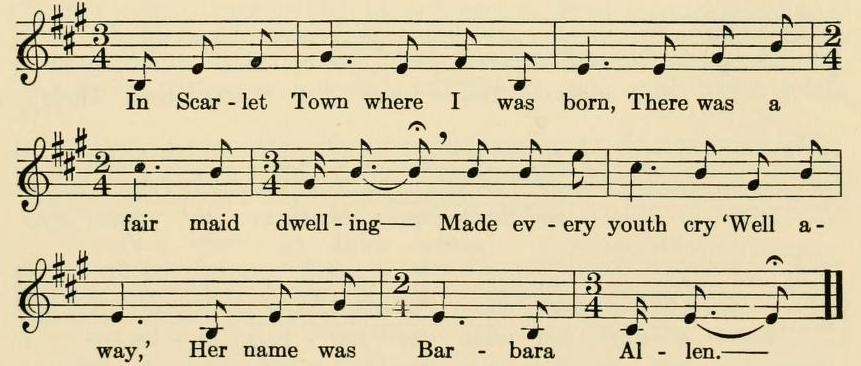
For melodic relationship of. **SCB 132, version B; and FSSH 81, No. 15A. Scale: Mode III, plagal. Tonal Center: e. Structure: abed (2,2,2,2).
A(1) 'Barbara Allen.' Sung by H. Eggers. Recorded at Boone, August 23, 1939. The last six measures are quite closely related to those of the Anonymous (27S) and the Pittman (27A(3)) versions.
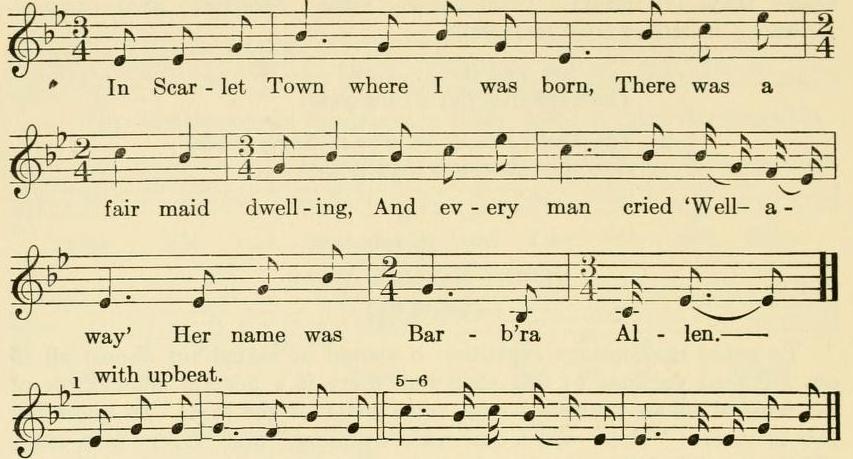
For melodic relationship cf. **MSHF 6; Sharp K i, 194-5, No. 24 M and P, basic melodic tendency of the very beginning. Scale: Mode III, plagal. Tonal Center: e-flat. Structure: abb1c (2,2,2,2) = ab (4,4).
A(2) 'Barbara Allen.' Sung by Mr. and Mrs. Nathan Hicks, with dulcimer. Recorded at Matney, Watauga county, July 28, 1939. This version makes use of the basic 'George Collins' tune.
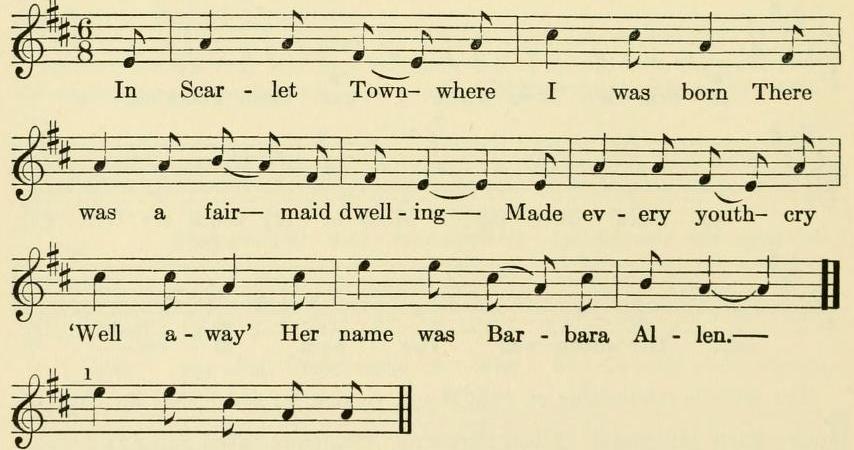
Scale: Mode III, plagal. Tonal Center: a. Structure: abac (2,2,2,2) = aa1(4,4).
A(3) 'Barbara Allen.' Sung by the Pittman brothers. Recorded at Handy, Davidson county, August 21, 1939. The last six measures are quite closely related to those of the Eggers 27A(1) and Anon 27S.
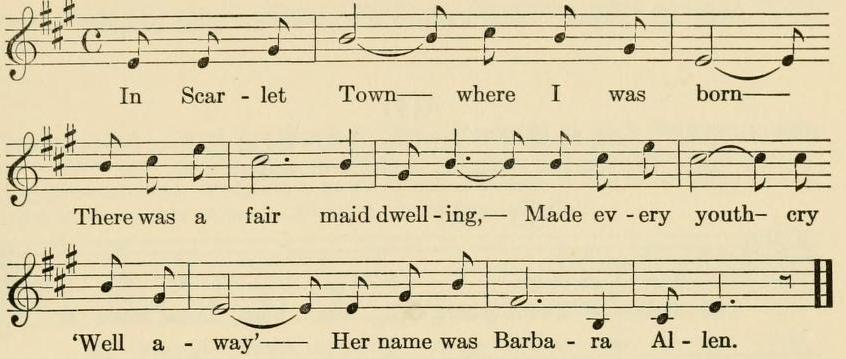
For melodic relationship cf. **SharpK i 192 and I95, No. 24K, measures 3-6 and version O, measures 2-4, basic melodic relationship only; MSHF 6, beginning and ending. Scale: Mode III, plagal. Tonal Center: e. Structure: abbk (2,2,2,2) = ab (4,4).
A(4) 'Barbara Allen.' Sung by Mrs. Laura Timmons. From previous recording of Dr. W. A. Abrams, Boone, August 8, 1940. Only the first three measures differ from the Horton Barker version. These are given below as variations. There is a partial relationship with 27O, 27S, 27S(i), 27V, 27FF, 27GG, 27HH,
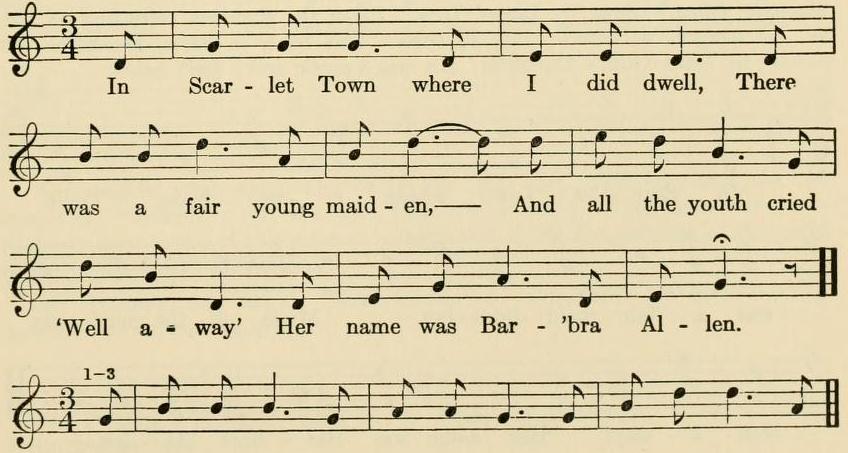
For melodic relationship cf. **SharpK I 183, No. 24A and 194, No. 24L, measures 3-6; also, SFSEA 150, No. 131; SCSM 387, version C; FSoA 8; FSF 28s, No. 161 B. Scale: Mode III, plagal. Tonal Center: g. Structure: abed (2,2,2,2).
A(5) "Barbara Allen.' Sung by Mrs. J. Trivette. Recorded at Heaton, Avery county, July 30, 1939. The melodic ending is like that of version 27O.
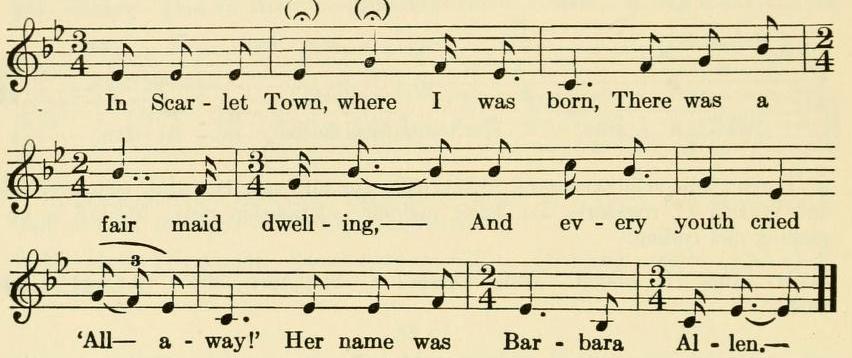
For melodic relationship cf. **SharpK I 184, No. 27B, measures 1-4, also No. 27I, measures 2-5. Partial resemblance FSOA 8. Scale: Mode III, plagal. Tonal Center: e-flat. Structure: abed (2,2,2,2); measures 5-6 are derived from 1-2.
A(6) 'Barbara Allen.' Sung by James York. From the previous recording of Dr. W. A. Abrams at Boone, July 8, 1940. This tune, in parts, resembles the melody to 'Lord Ullin's Daughter,' No. 329 (music score 506) below.
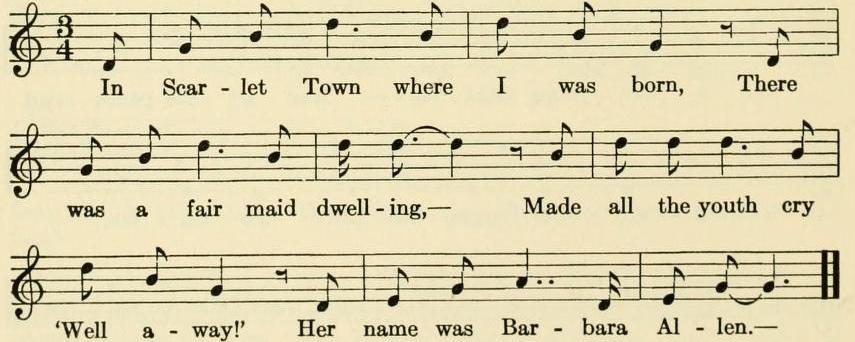
For melodic relationship cf. **SharpK i 194, No. 27M, less in 192 J and K. Excepting the major versus the minor triad, the melodic trend in our version and that of Sharp is the same. FSF 285, No. 161 B. Scale: Mode III, plagal. Tonal Center: g. Structure: abb1c (2,2,2,2) = ab (4,4).
B. 'Barbara Allen.' Sung by Frank Proffitt. Recorded at Pick Britches, Sugar Grove, Watauga county, July 24, 1939. The skip of a descending diminished fifth (measure 15), revealing a more recent influence, is not to be found in any of the songs of this name contained in the Sharp collection.
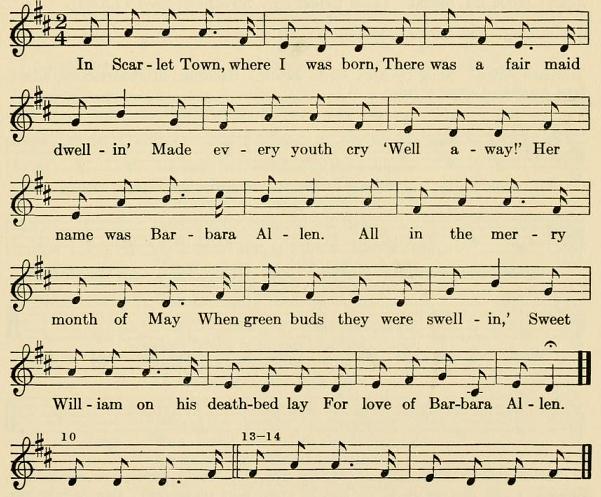
For melodic relationship cf. **FSF 287, No. 161 C, first four and last two measures ; *SharpK i 194, No. 27L, measures 2 and 5. This latter version is the only occurrence of this type of progression in all the versions of this song found in the Sharp collection. Scale: Heptachordal, plagal. Tonal Center: d. Structure: abaicaiba2d (2,2,2 2,2,2,2,2) = aa1a1a1 (4,4,4,4).
E. 'Barbara Allen.' Sung by Mrs. C. K. Tillett, at Wanchese, Roanoke Island, December 29, 1922.

For melodic relationship cf. **SharpK r 183, No. 24A and 185, No. 24C, ending; SOCH 23, 'Heavenly Dove.' Scale: Mode III, plagal. Tonal Center: g. Structure: abed (2,2,2,2).
G. 'Barbara Allen.' Sung by Mrs. G. L. Bostic. Recorded at Mooresboro, Cleveland county, August 7, 1939.
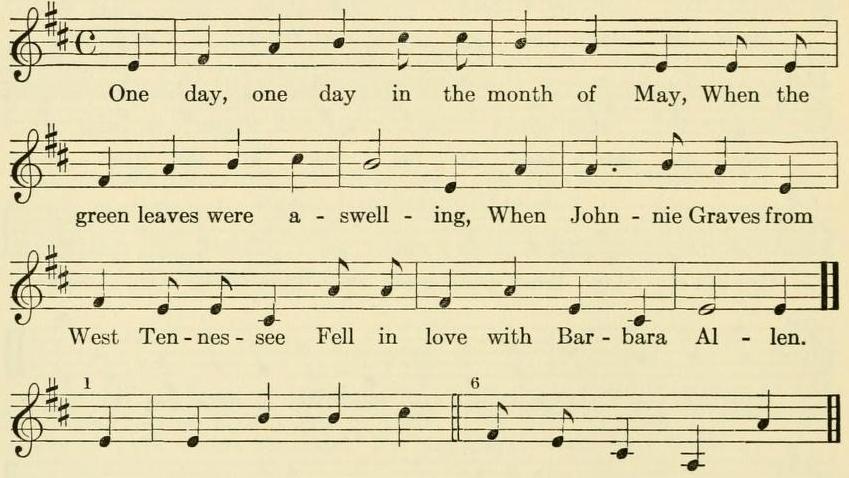
For melodic relationship cf. **FSF 289, No. 161D (first five measures); SharpK i 188, No. 24 E, F, G, and H (first four measures) ; also SCSM 387, version F. Although rhythmically totally different, there is a surprising similarity in the purely melodic line. This is also true of BB 54, version B; BSM 63, version K; BSI 106, version D; TBV 578, version 24U, 580 versions 24 HH, II, and JJ ; also FSS 523, No. 16F; FSKM 40, the very beginning; BSO 52, No. 1 6 A, interesting comparison. Scale: Mode III, plagal. Tonal Center : a. Structure : aa^bc (2,2,2,2) = ab (4,4). Circular Tune (V).
O. 'Barbara Allen.' Sung by Dr. I. G. Greer. Recorded as ms score from I. G. Greer of Boone, Watauga county. No date given. The text was given to the present editor by Dr. Greer in 1953. Basic melodic points in common with other versions are ingeniously employed to create a new version.
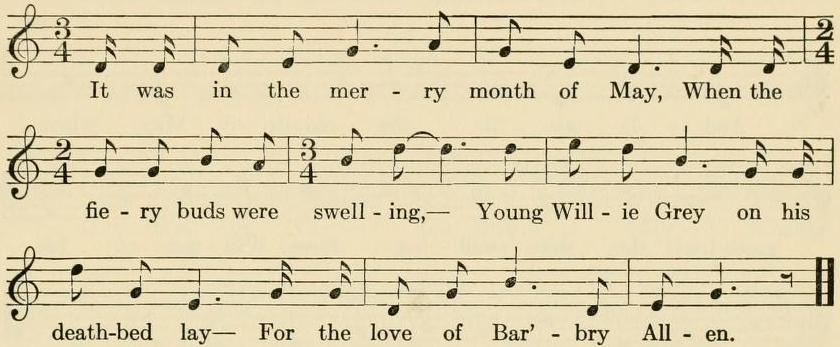
For melodic relationship cf. **SharpK i 183, No. 24A; TBV 579, No. 24DD, first three measures ; *MSHF 6 ; SFSEA 150, No. 131. Scale: Mode III, plagal. Tonal Center: g. Structure: abed (2,2,2,2).
2 He sent his servant to the town
To tell her to come and see him.
And slowly, slowly she arose,
And slowly went to see him.
3 And when she got there, all she said,
'Young man, I think you're dying.
And die, oh die, oh die you may !
You can't get Barbara Allen.'
4 'I'm low, I'm low, I'm low indeed,
And death is in me dwelling.
But never better will I be
If I can't get Barbara Allen.'
5 'Don't you remember the other day
When we were at the tavern drinkin',
You drank a toast to the ladies all
And slighted Barbara Allen?'
6 'Yes, I remember the other day
When we were at the tavern drinkin';
I drank a toast to the ladies all
And three to Barbara Allen.'
7 'Do you remember the other night
When we were at the ballroom dancing,
You gave your hand to the ladies all
And slighted Barbara Allen?'
8 'Yes, I remember the other night
When we were at the ballroom dancing,
I gave my hand to the ladies all
And my heart to Barbara Allen.'
S. 'Barbary Allen.' Sung by anonymous singer. Procured by Mrs. Sutton. No mention of singer, date, or place. In a second ms text, the second line reads "When all the flowers were blooming." Likewise "fur" instead of "for."
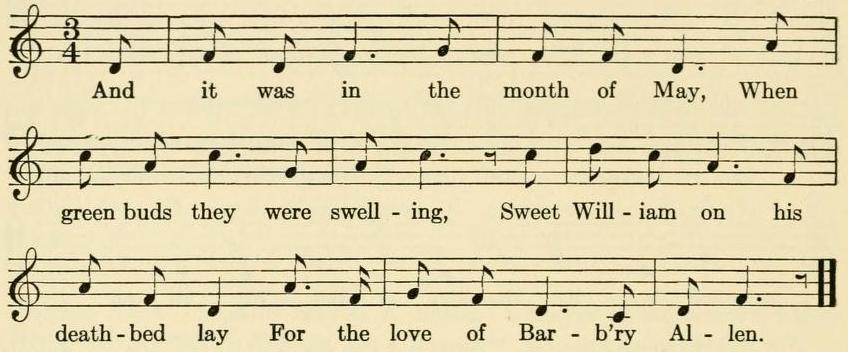
For melodic relationship cf. FSOA 8; MSHF 6. Scale: Mode III, plagal. Tonal Center: f. Structure: abed (2,2,2,2); the third measure is derived from the first, and the seventh from the fifth.
S(1) 'Barbara Allen.' I. G. Greer? Dr. White attributes this to Mrs. Sutton. There is, in either case, no place or date given.
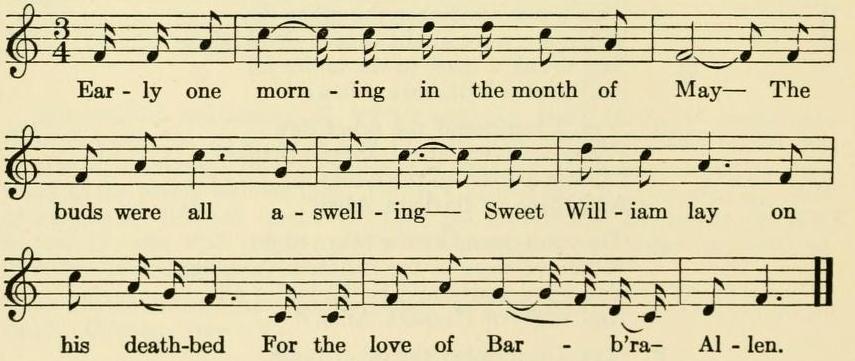
At the end of the section dealing with Barbara Allen, No. 27, in vol. II, 131 there is mention of a sheet "on which is written a tune set to the first stanza of 'Barbara Allen' and the stanza of 'Lord Thomas and Fair Annet' . . . ." There is such a sheet, but it contains two distinct melodies, one for 'Barbara Allen,' the other for 'Lord Thomas and Fair Annet.' Our version here is the
first on that sheet. Both tunes are given with their texts.
For melodic relationship cf. **SharpK i 183, No. 24A, measures 4-8, 185, No. 24C, measures 3-8; 191, No. 24I, measures 3-6; 195, No. 24N, general tendency, and No. 24P, beginning; FSoA 8; OFS i 127, No. 21 A; BSM 62, version G; FSF 285, No. 161B; and SFSEA 150, No. 131. *FSKM 40. Scale: Mode III, plagal. Tonal Center: f. Structure: abcd (2,2,2,2).
V. 'Barbara Allen.' Sung by Otis Kuykendall. Recorded at Asheville in 1939.
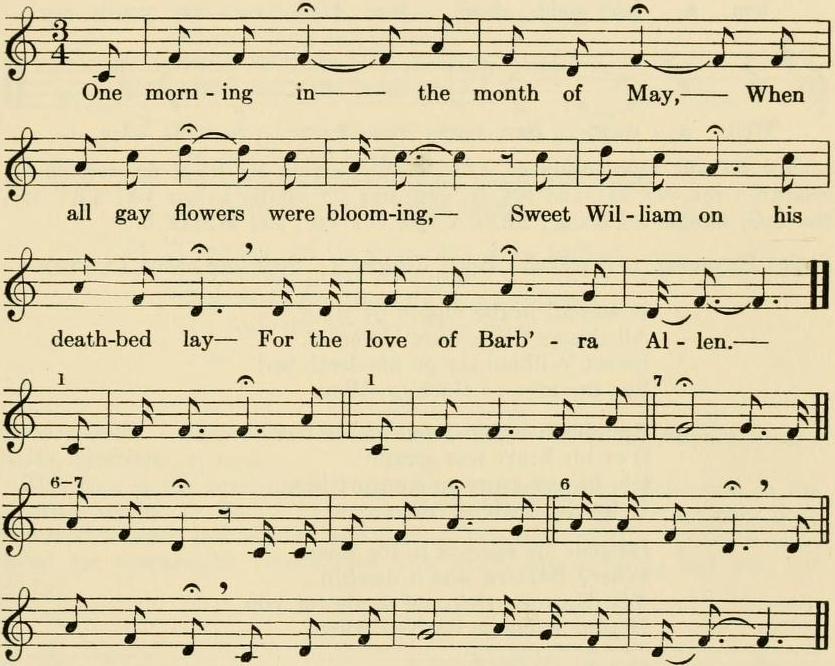
For melodic relationship cf. *SharpK I 184, No. 24B, measures 2-8; SFSEA 150, No. 131. SCSM 387, version C. This is the only one of all other versions in which the fifth measure is entirely the same as that of our version. Scale: Mode III, plagal. Tonal Center: f. Structure: abed (2,2,2,2).
AA. 'Barbara Allen.' Vol. II, 129 says, "The air accompanying this text. . . ." No record or score came to the present editor.
FF. 'Barbara Allen.' Sung by H. J. Beaker. Recorded in August 1939, 1940, or 1941. No place given. There is partial but considerable similarity with 27GG and the Horton Barker versions. Cf. also 27A(i), 27A(4), as well as 27S(i).
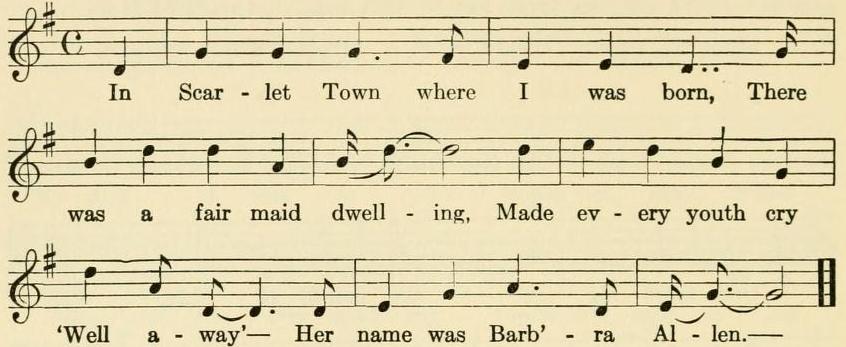
For melodic relationship of. **SCB 132, version B; BSM 62, version G; SharpK i 191, No. 24I, and 195, N, measures 5-7 similar to our 3-5; TBV 577, No. 24G, similar beginning; SFSEA 150, No. 131; and MSHF 6. Scale: Hexatonic (4), plagal. Tonal Center: g. Structure: abed (2,2,2,2).
2 It was all in the month of June,
All things there were bloomin'.
Sweet William lay on his death bed
For the love of Barb'ra Allen.
3 And death was painted on his face,
O'er his heart was stealin'.
Oh, hasten away to comfort him,
O lovely Barb'ra Allen.
4 He sent his servant to the town
Where Barb'ra was a dwellin'.
'My Master's sick and sends for you,
If your name be Barb'ra Allen.'
5 Slowly, slowly she got up,
Slowly she came nigh him.
And all she said when she got there,
'Young man, I think you're dyin'.'
6 'Oh, I am sick, very sick,
Death on me is stealin'.
No better, no better I never can be
If I can't have Barb'ra Allen.'
7 'Oh, yes you're sick, very sick,
Death on you is stealin',
No better, no better you never can be
For you can't have Barb'ra Allen.'
8 'Oh, don't you remember in yonder town
You were at the tavern.
You drank a health to the ladies all around,
But slighted Barb'ra Allen.'
9 As she was on her highway home,
The birds they kept a-singing'.
They sang so clear and seemed to say,
'Hard-hearted Barb'ra Allen.'
10 She looked to the east, she looked to the west
And spied his corpse a-comin'.
'Lay, lay down that corpse o' clay
That I may look upon him.'
11 'Oh, mother, oh, mother, go make my bed,
Make it long and narrow.
Sweet William died for pure, pure love,
And I shall die for sorrow.'
12 She was buried in the old church yard,
He was buried nigh her.
On William's grave there grew a red rose,
On Barb'ra's grew green briers.
13 The rose and the brier they grew so high
They could grow no higher.
They met and formed a true love-knot,
The rose wrapt around the brier.
GG. 'Barbara Allen.' Sung by H. R. Buchanan. Recorded at Minneapolis, Avery county, September 7, 1939. This tune is the basic melody underlying the lovely variation given in the following version by Becky Tarwater (27HH). There is likewise only little difference between this version and that of Wiseman (27II). There is only partial but considerable resemblance with 27FF, measures 3-5 and 7-8, and 27A(4).
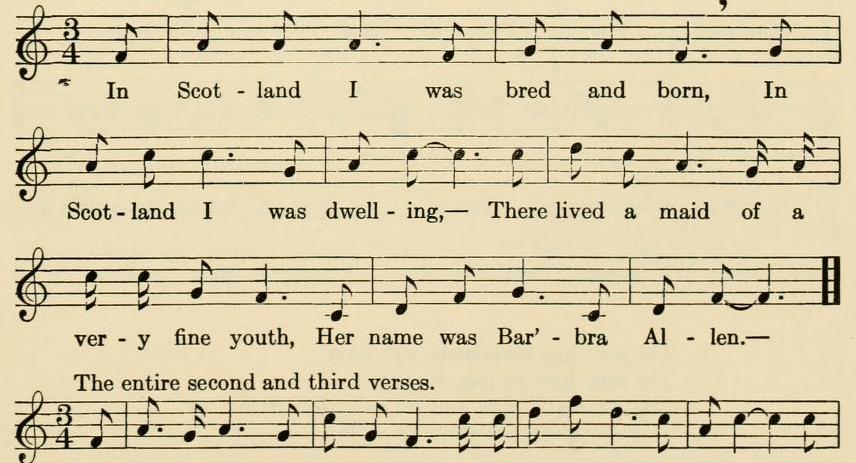

For melodic relationship cf. ***TAFL 820; FSF 285, No. 161B; **SCSM, 387, version C and 388, version H; FSoA 8; OFS i 127, No. 21 A; SCB 132, version B; BSM 62, version G; TBV 577, No. 24H ; SFSEA 150, No. 131. SharpK i 185, No. 27C, basic melodic line. Scale: Mode III, plagal. Tonal Center: f. Structure: abcb1 (2,2,2,2) = ab (4,4).
HH. 'Barb'ry Allen.' Sung by Becky Tarwater. Recorded in August 1939, 1940, or 1941. No place given. This tune is a perfect example of the intuitive art of variation which the true folk singer has as his native endowment. Actually this version is only a variation of the Buchanan version (27GG), but what a difference that makes.
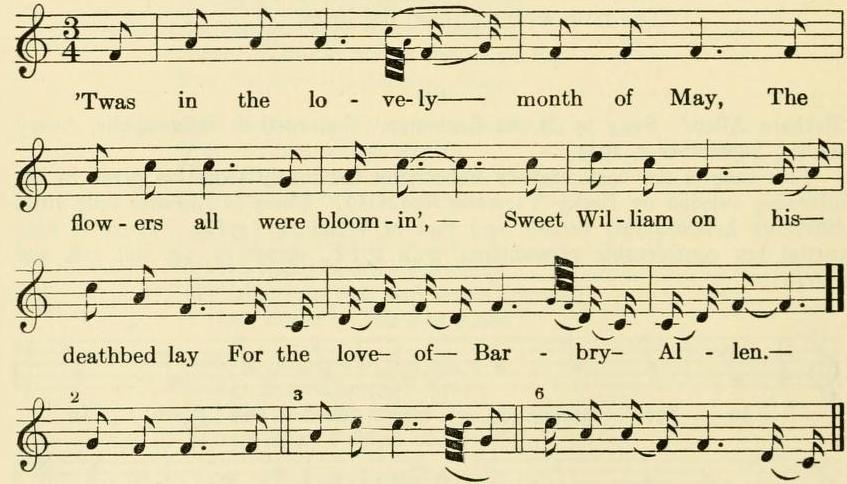
For melodic relationship cf. **SharpK i 185, No. 27C for basic melodic outline; also SFSEA 150, No. 131. Scale: Mode III, plagal (4,4). Tonal Center: f. Structure: abcb1 (2,2,2,2) = ab
2 He sent his servant to her door,
He sent him to her dwellin'.
'My master's sick and he calls for you
If your name be Barb'ry Allen.'
3. Then slower, slower got she up
Unto his bedside going.
My master's sick and he calls for you
If your name be Barb'ry Allen.
4. He turned his pale face to the wall
And bursted out a-cryin',
'Adieu, adieu to all beloved,
Adieu to Barb'ry Allen.'
5. Sweet William died on Saturday night
And Barb'ry died that Sunday.
Their parents died for the love of the two,
They was buried on a Easter Monday.
5. A white rose grew on William's grave,
A red rose grew on top of it.
They climbed and they climbed in a true lover's knot
A-warning young people to marry.
II. 'Barbara Allen.' Sung by Mrs. Manassa Wiseman. Recorded at the foot of Buck Hill, September 1, 1939. Mrs. Wiseman was 79 years old. Only a slight variation of the 27GG and very similar to 27A(4).
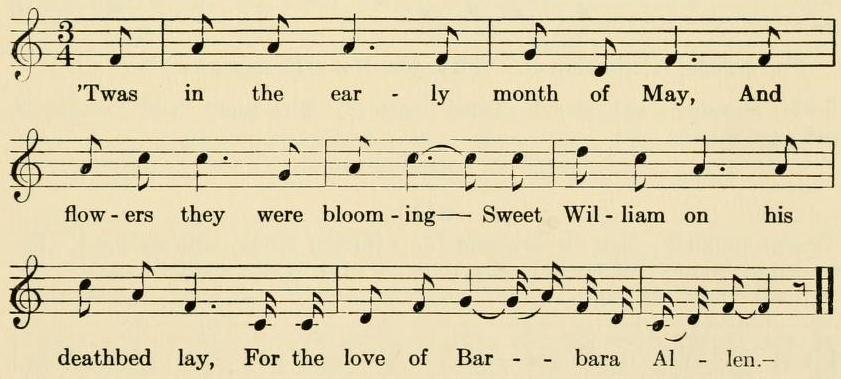
For melodic relationship cf. ***SCSM 387-8., versions C and H ; **FSF 284, No. 161A and 285, N0.161B; FSoA 8; OFS i 127, No. 21 A; SCB 132, version B; BSM 62, version G; TBV 577, No. 24H and SFSEA 150, No. 131. Scale: Mode III, plagal. Tonal Center: f. Structure: abed (2,2,2,2).